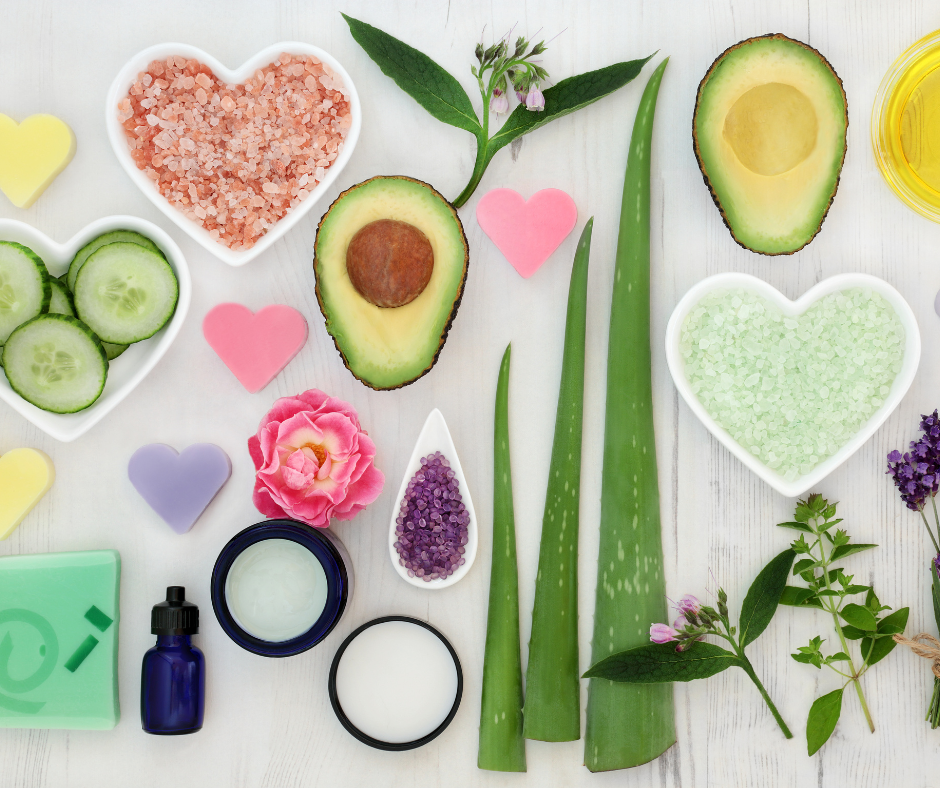
In the world of wellness, it’s not just about what our diet and lifestyle can do for our internal health and well-being, but how it can also impact our external wellbeing, potentially improving the quality and appearance of our skin and hair for example. However, if you do a quick search online, you might find many ‘miracle cures’ including pills and powders that claim to improve your skin health, reverse ageing or UV damage but is it really that simple? The fact of the matter is that if something sounds too good to be true, it probably is!
Our skin is the biggest organ in the body and similar to our other organs such as our heart and brain, eating a healthy balanced diet can support our skin health, although it is not a miracle cure. With that being said, there are some nutrients that could be worth prioritising in the diet to support healthy skin.
Protein & Energy – Our skin comprises proteins such as elastin and keratin, so it will be affected by a lack of adequate protein (rare in Western populations), as well as a lack of energy (calories e.g. in restrictive diets). If you follow a plant-based diet it may be more challenging to meet your daily protein requirements, so aim to include plant-based proteins such as soya and mycoprotein, and combine plant-based sources such as beans and lentils to obtain all the essential amino acids that our skin needs.
Sources include: Meat, fish, lentils, beans, eggs, soya and dairy.
Vitamin A – Ensuring you have a sufficient intake of vitamin A through the diet can help to support the skin’s texture, moisture and elasticity. Low levels have also been associated with an increased incidence in acne (although vitamin A deficiency is uncommon in the developed world).
Sources include: Eggs, salmon, carrots, tomatoes, sweet potatoes and leafy green veggies.
Vitamin C – A powerful anti-inflammatory antioxidant which supports the body’s production of collagen and helps to protect against UV damage.
Sources include: Citrus fruits, kiwis, berries, bell peppers and leafy greens.
Vitamin E – An antioxidant which protects the skin against cell damage from pollutants (including the sun) by fighting free radicals.
Sources include: Seeds, sunflower oil, nuts, dairy and meat.
Zinc – Helps with wound healing and making new cells, as well as protecting against UV damage.
Sources include: Red meat, poultry, nuts, fortified wholegrains, shellfish and fish.
Selenium – An antioxidant that provides skin elasticity and protects it from the sun.
Sources include: Brazil nuts, fish, meat and eggs.
Omega 3 fatty acids – Contain anti-inflammatory properties and help to protect the skin’s outer layer which helps to retain moisture and prevent dry skin.
Sources include: Oily fish, walnuts, chia seeds, flaxseed and rapeseed oil.
Keeping well hydrated is key for optimal skin health too! We should aim to drink at least 6 to 8 glasses of fluids per day, hot drinks such as teas, coffees and fruit juices count too. Although we should limit fruit juice to 1 x 150ml (small) glass and keep mindful of our caffeine intake to keep below the recommended amount which is between 400-500mg a day (approx 4-5 x cups of instant coffee).
Some research suggests an association between a high alcohol consumption (>14 units a week) and increased risk of psoriasis, which is an inflammatory skin condition, so as well as the many other reasons why we should limit our alcohol consumption, it’s advised to have no more than 14 units, spread throughout the week.
What can support the ageing process of our skin?
The best thing that you can do to delay ageing of the skin prematurely is to wear an SPF (minimum 30) every day especially throughout the months of April – October to protect against the sun’s UV rays.
A buzzword that you may have heard on beauty adverts (to name a few linked to our skin) is collagen. Despite the many “collagen-boosting” supplements on the market, we don’t have robust scientific evidence to confirm that the collagen we eat is converted to structural collagen in our skin! This means that the jury is still out on oral collagen and ageing skin. Instead, it’s best to eat a variety of different animal and plant-based protein sources such as meat, fish, dairy, lentils and beans. This way you’ll also be keeping your gut microbes happy and ward off stress; all of which influence our body’s ability to make collagen.
Can dietary choices have an impact on acne?
Although there aren’t any current “gold standard” research studies to suggest a link between nutrition and acne, there is some research to highlight possible associations. However, most importantly there isn’t a dietary solution to controlling acne (despite what the internet tells you!) – it’s mainly linked to genetics and hormones.
Dairy – One food group that there are certainly a lot of articles online about when it comes to acne is dairy, due to the presence of hormones and bioactive molecules found in skimmed milk. However, there is limited and conflicting research to support this and it is only really a concern in the US as it is illegal to inject hormones into cows in the EU (and there’s strict use on antibiotics too). However, in some people, insulin-like growth factor (IGF)-1 levels are increased when we drink milk, which has been linked to acne.
Other products such as cheese and yoghurt don’t seem to have an effect, although the research is conflicting. If you choose to cut down on your milk or replace it with a plant-based alternative to see if there are improvements, opt for those fortified with vitamins and minerals such as iodine, calcium and vitamin D. Seek support from a dietitian before removing multiple foods/food groups from your diet.
Sugar – Another common myth is that sugar causes acne. Although there is no research to prove a ‘cause and effect’, the associations are because of the fact that sugary foods tend to be higher on the glycemic index (GI) scale, which (in large amounts) stimulates the IGF-1. It is thought that the IGF-1 encourages the growth of oil glands making the skin more oily and prone to acne. Other high-glycemic foods include white rice, white bread and mashed potatoes; meaning (when eaten in large amounts by themselves) can cause a spike in blood-glucose levels, similarly to sugary foods such as sweets and soft drinks.
However, this doesn’t mean you have to cut out higher-GI foods. Despite the potential association with an increased incidence of acne, combining higher GI foods with protein and healthy fats can help to reduce the GI and keep you fuller for longer too. An example of this could be combining dried fruit with nuts or a slice of toast with a yoghurt. Including lower-GI carbohydrates in the diet such as whole grains, fruit and veg, pulses and legumes can benefit health by providing a source of fibre and a variety of different nutrients to support health.
Take home message
Your skin health is more about what you ADD to your diet, rather than take away. There is some evidence to show that anti-inflammatory foods and nutrients such as omega-3 fatty acids can support good skin health so ensure to prioritise unsaturated fats in the diet such as oily fish, olive oil and nuts and seeds.
Consuming a Mediterranean style diet which comprises a variety of whole foods such as fruit and vegetables, lean proteins, wholegrains and pairing higher GI foods with lower GI foods to help stabilise blood glucose levels and provide a sustained source of energy throughout the day.
